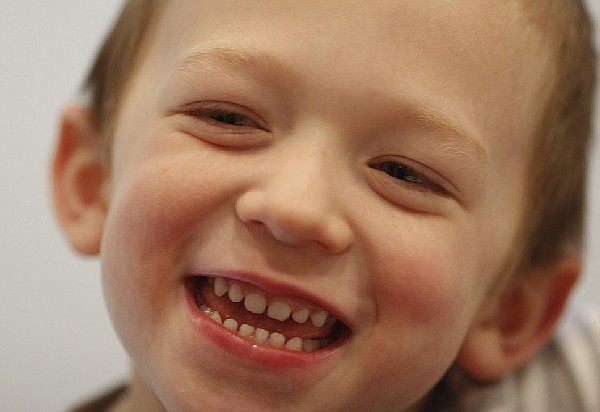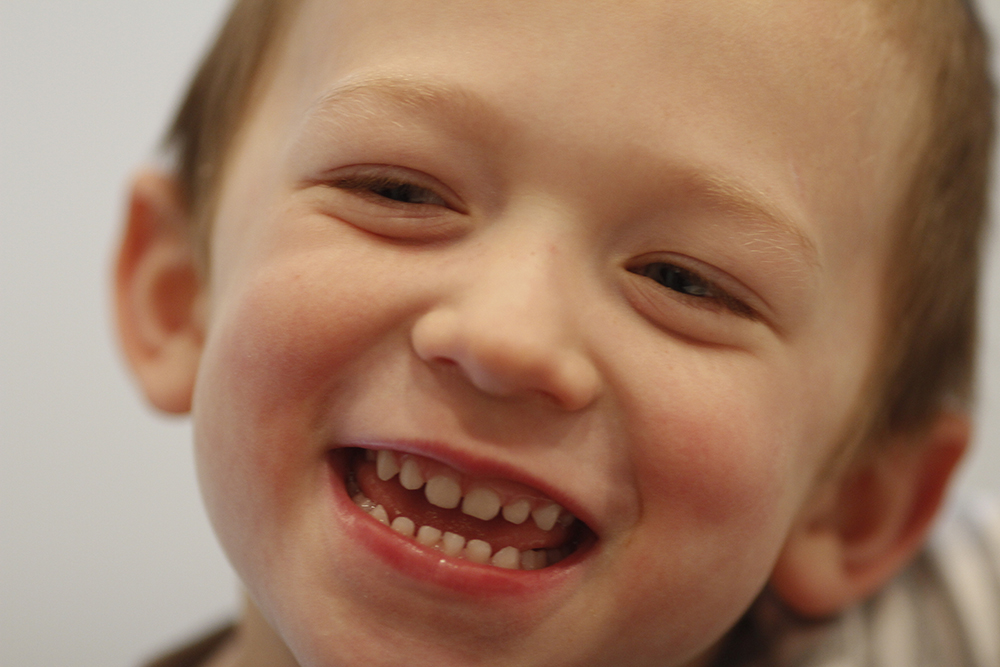Baby teeth: When should you introduce your child to the dentist?
Monday, February 3, 2014
CARING FOR BABY TEETH• Clean child's mouth and gums daily with a soft infant toothbrush or wet cloth. Begin brushing as soon as teeth appear.• Children older than 6 months need supplements if your water does not contain fluoride. Fluoride supplementation in infants has shown to reduce tooth decay by as much as 50 percent.• Avoid breast- and bottle-feeding at will when the first primary teeth begin to erupt. After each feeding, wipe baby's gums and teeth with clean gauze or a washcloth. Don't allow child to fall asleep with a bottle containing anything but water.• Encourage infants to drink from a cup around their first birthday. Your baby should be weaned from the bottle entirely by 12-14 months of age.• Avoid giving baby sugar water, juice and soft drinks.• Do not share utensils, toothbrushes or other items that come into contact with your mouth with your baby. Adults can transfer cavity-causing bacteria to children.Source: The American Academy of Pediatric Dentistry
Three-year-old Beau Brogdon was not at all impressed with his recent visit to his grandfather's workplace. In fact, he couldn't wait to leave.
His grandfather, Dr. Joe Brogdon, has a dental practice in Red Bank, and Beau made his first trip to see his "Potki" as a patient.
"Obviously, Beau knows his granddad well and has even met much of the staff before, but he was having no part of sitting in the chair and opening his mouth," says his mom, Sarah Brogdon. "He sat in the chair, but then completely shut down - crossed his arms, turned his head and wouldn't look at anybody. He basically tried to hide in the chair. Kind of funny, actually.
"So, we decided not to press it, just to wait and try again in a few months."
Maybe.
Her father told them that "it really isn't necessary to get kids to the dentist too young. After all, baby teeth do fall out," she says. "He emphasizes the importance of establishing good oral hygiene habits early - brushing regularly, etc. However, he did think visiting the dentist early on is a good way for kids to become comfortable with the office, sitting in the chair, etc.
"As long as kids are not having any issues, going too early can be an unnecessary expense," she says.
Still, the American Academy of Pediatric Dentists and the American Academy of Pediatrics recommends children as young as 12 months visit a dentist for the first time. That first visit should include taking medical histories for both the child and the parents, an oral exam, a toothbrushing demonstration, according to the American Academy of Pediatric Dentistry's website.
Dr. Charles Ankar, with the Shallowford Family Dental Group in East Brainerd, agrees with that philosophy.
"In order to prevent dental problems, your child should see a pediatric dentist when the first tooth appears, or no later than his/her first birthday," Ankar says.
At his office, that first visit includes showing parents how to properly care for their baby's teeth and what to look for as the teething process begins.
"The most important thing is to begin to develop good oral hygiene habits early in life," he says. "Starting at birth, clean your child's gums with a soft infant toothbrush or cloth and water. As soon as the teeth begin to appear, start brushing twice daily using fluoridated toothpaste and a soft, age-appropriate-sized toothbrush. Use a smear of toothpaste to brush the teeth of a child less than 2 years of age."
Remember,these are very young children, he explains, so make brushing fun.
"Use a favorite doll to simulate brushing or try brushing to their favorite song so they know that they need to continue until the song ends - preferably two minutes."
For 2- to 5-year-olds, Ankar says parents should either do the toothbrushing themselves or help the child do it.
"Young children do not have the ability to brush their teeth effectively," he says. Part of that is children's tendency to swallow the excess toothpaste instead of spitting it out.
Jeannette McDonald, mother of Shad, 4, and Knox, 16 months, says she only recently took her oldest son to his first dentist visit.
"He did not take well to being there," McDonald says. "I was surprised because he loves tools and small lights, which the dentist had plenty of."
The news was good, though. Shad has no cavities and the dentist said he has perfect teeth, McDonald says.
"He said just keep doing what we're doing and sent us on our way," she says. "I thought it was a total waste of time and money and put Shad and I in a power struggle of 'you must sit for the dentist' that we just didn't need. I won't take Knox for many years, unless, of course, there is something that needs to be checked out.
"My kids don't eat sugary foods or drink juice so I'm not too worried about cavities," she says.
Sarah Brogdon says it's important to teach young children good dental habits, including using "fun" toothbrushes.
"We make sure to brush twice a day, at least, and I think it's equally important that we limit sugary sweets that lead to tooth decay," she says. "We buy toothbrushes with characters that our son likes - Thomas the Train, Cookie Monster, etc. In fact Santa Claus left a handful of toothbrushes in his stocking."
She says she has experimented with different toothpastes to find one her son likes.
"I just make sure to buy the ones tailored to toddlers that are not dangerous if swallowed (in small amounts)," she says.
Beau prefers brushing his own teeth these days, Brogdon says. "But I also help."
As the child gets older, the dentist can add other techniques such as flossing to the exam.
"Flossing is definitely important but sometimes difficult to do on children," Ankar says. "Simply placing the floss in between their teeth will help them get used to the sensation so that it is easier later in life."
Contact Karen Nazor Hill at khill@timesfreepress.com or 423-757-6396.


